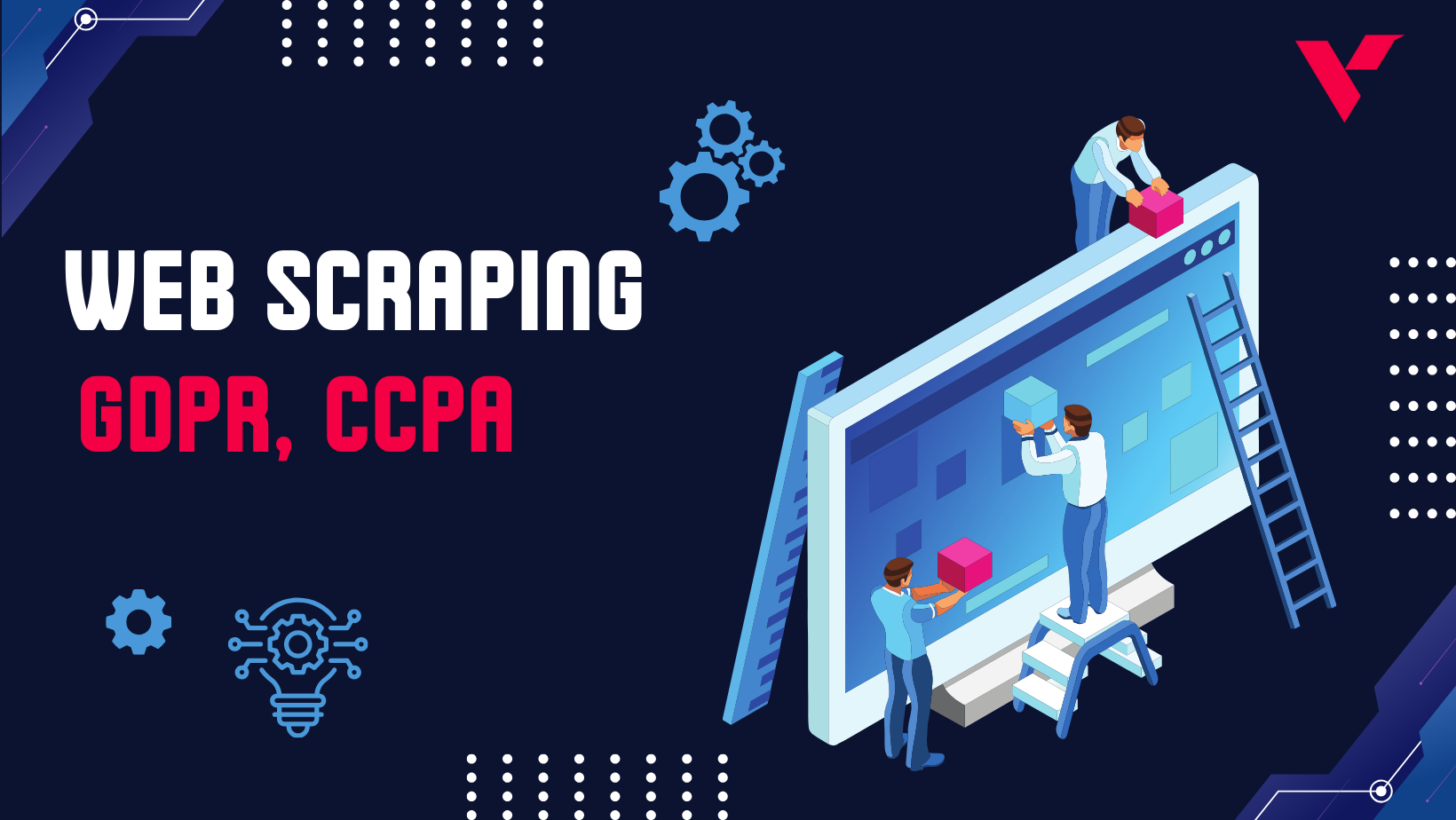Regulatory Challenges in Web Scraping: GDPR, CCPA, and Beyond

Strong 8k brings an ultra-HD IPTV experience to your living room and your pocket.
Introduction
Web scraping, the automated process of extracting data from websites, has become an essential tool for businesses, researchers, and analysts. While it provides valuable insights and competitive advantages, web scraping services also faces significant regulatory challenges. The legal landscape surrounding web scraping is complex, as it intersects with various laws related to copyright, privacy, and data protection.
1. Legal Ambiguities and Jurisdictional Issues
One of the primary challenges in web scraping is the lack of clear, universally accepted regulations. Different jurisdictions have varying laws governing web scraping, making compliance a complex issue for businesses operating globally. For instance:
United States: Web scraping legality often depends on the interpretation of the Computer Fraud and Abuse Act (CFAA), which prohibits unauthorized access to computer systems.
European Union: The General Data Protection Regulation (GDPR) imposes strict rules on data collection and processing, affecting web scraping activities that involve personal data.
India & Other Countries: India has the Information Technology Act, which does not explicitly address web scraping but contains provisions on data protection.
This patchwork of regulations creates uncertainty for companies engaged in web scraping, requiring them to tailor their practices to comply with multiple legal frameworks.
2. Terms of Service (ToS) Agreements and Breach of Contract
Most websites include terms of service (ToS) agreements that explicitly prohibit web scraping. Courts have debated whether scraping in violation of ToS constitutes a breach of contract. Key cases include:
hiQ Labs v. LinkedIn (2022): The U.S. Ninth Circuit ruled that publicly available data could be scraped, but LinkedIn could still enforce its ToS through legal actions like cease-and-desist letters.
Facebook v. Power Ventures: Power Ventures was found to have violated the CFAA by accessing Facebook’s servers without authorization.
Web scrapers must navigate these ToS agreements carefully to avoid potential legal repercussions, including lawsuits or being blocked from accessing sites.
3. Intellectual Property and Copyright Laws
Scraped content may be protected under intellectual property laws, particularly copyright. While factual data (such as stock prices or weather reports) is generally not copyrighted, creative or structured presentations of data may be.
Database Protection: The EU’s Database Directive protects databases where substantial effort has been invested in data organization, impacting scrapers who extract structured data.
Fair Use Considerations: In some cases, limited scraping may be permitted under fair use doctrines, but this varies by jurisdiction and case specifics.
4. Privacy and Data Protection Laws
Web scraping becomes legally challenging when it involves personal data, as many privacy laws protect user information.
GDPR (EU): Requires informed consent for data collection and grants individuals rights over their personal data. Unauthorized scraping of personal data could lead to severe penalties.
CCPA (California, USA): Provides consumers with rights over their data and allows them to opt out of data collection, making compliance critical for scrapers handling personal data.
Other Data Protection Laws: Many countries, including Brazil (LGPD) and India (DPDP Bill), have enacted strict data protection laws that impact web scraping activities.
Businesses must ensure that their scraping practices do not infringe on privacy laws by anonymizing data and obtaining necessary permissions.
5. Anti-Bot and Cybersecurity Laws
Many jurisdictions have laws against unauthorized automated access to websites.
CFAA (USA): Criminalizes unauthorized access to computer systems, often used to target web scrapers.
UK Computer Misuse Act: Similar to the CFAA, it penalizes unauthorized access and data extraction.
CAPTCHA and Anti-Bot Measures: Websites implement technological barriers like CAPTCHA to prevent scraping. Circumventing these measures can be legally questionable and could lead to claims of unauthorized access.
Companies engaging in web scraping should be aware of these laws and avoid tactics that could be interpreted as unauthorized access.
6. Competition and Antitrust Considerations
Web scraping can also raise antitrust concerns, particularly when large companies restrict access to data that could benefit smaller competitors.
Google v. Yelp: Yelp has accused Google of scraping its reviews while restricting competitors from indexing Google’s content.
Market Power and Data Access: Some argue that restricting web scraping can lead to monopolistic practices, stifling innovation.
Regulators are increasingly scrutinizing how data access policies impact competition, and businesses must be aware of these concerns when engaging in scraping activities.
7. Ethical Considerations in Web Scraping
Beyond legal issues, ethical concerns arise in web scraping, particularly regarding transparency and data ownership.
Informed Consent: Users often do not realize their data is being scraped, raising ethical concerns about transparency.
Impact on Website Performance: Heavy scraping can overload servers, affecting website performance and availability.
Misuse of Data: Scraped data can be used for fraudulent activities, misinformation, or other unethical purposes.
Implementing ethical scraping practices, such as respecting robots.txt files and limiting the frequency of requests, can help mitigate these concerns.
Understanding GDPR and Web Scraping
The GDPR is a comprehensive data protection regulation designed to safeguard the privacy and rights of individuals within the European Union (EU). It applies to any organization that collects, processes, or stores personal data of EU residents, regardless of the organization’s geographical location. Web scraping, which involves the automated extraction of data from websites, often falls within the purview of GDPR when personal data is involved.
Key Regulatory Challenges
1. Consent and Lawful Basis for Data Processing
Under GDPR, organizations must have a lawful basis for collecting and processing personal data. The six lawful bases include:
- Consent
- Contractual necessity
- Legal obligation
- Vital interests
- Public interest
- Legitimate interests
Web scraping often does not involve explicit user consent, raising compliance issues. Websites that display personal data typically do not provide consent for automated data collection. Furthermore, relying on legitimate interest as a justification requires careful consideration to balance the organization’s needs with the individual’s rights.
2. Right to Be Informed and Transparency
GDPR mandates that individuals be informed about how their data is collected and used. Scraping personal data from websites without notifying the data subjects contradicts this principle. Organizations engaged in web scraping must ensure that individuals are aware of their data collection activities, which can be challenging when scraping publicly available data.
3. Right to Access, Rectification, and Erasure
Individuals have the right to access their data, request corrections, and demand deletion under GDPR. Web scrapers that collect and store personal data must implement mechanisms to honor such requests. However, managing these requests becomes complex when data is gathered from multiple sources and processed by various entities.
4. Data Minimization and Purpose Limitation
GDPR enforces the principles of data minimization and purpose limitation, meaning organizations should collect only the data necessary for a specific purpose. Web scraping often involves bulk data extraction, which may exceed what is necessary, leading to regulatory concerns.
5. Legal Implications of Publicly Available Data
One common argument for web scraping is that the data being extracted is publicly available. However, GDPR does not distinguish between public and non-public personal data. Even if data is accessible on a website, it does not mean it can be freely scraped and processed without compliance with GDPR principles.
6. Automated Decision-Making and Profiling
Web scraping is often used to collect data for profiling and automated decision-making, such as in marketing, recruitment, and financial assessments. GDPR imposes strict requirements on such activities, particularly if they have significant legal or similar effects on individuals. Organizations must ensure transparency, fairness, and the right for individuals to contest automated decisions.
7. Data Security and Protection Measures
GDPR mandates stringent data security measures to protect personal data from unauthorized access, loss, or misuse. Organizations engaged in web scraping must implement robust security practices, including encryption, anonymization, and access controls. Failure to secure scraped data can lead to severe penalties under GDPR.
8. Cross-Border Data Transfers
Many web scraping operations involve cross-border data transfers, particularly when organizations process data outside the EU. GDPR imposes strict regulations on such transfers, requiring adequate safeguards, such as Standard Contractual Clauses (SCCs) or compliance with an adequacy decision by the European Commission.
Legal Precedents and Enforcement Actions
Several legal cases and regulatory actions highlight the risks associated with non-compliant web scraping:
HiQ Labs v. LinkedIn: Although this case was in the United States, it set a precedent regarding unauthorized web scraping. GDPR compliance remains a concern for similar cases in the EU.
CNIL’s actions against Google and Amazon: The French Data Protection Authority (CNIL) has imposed hefty fines for improper data collection and processing practices, underscoring the strict enforcement of GDPR principles.
Meta’s (Facebook) regulatory scrutiny: Facebook has faced multiple investigations concerning data scraping incidents, reinforcing the need for stringent compliance measures.
Compliance Strategies for Web Scraping
Organizations involved in web scraping can adopt several strategies to mitigate GDPR risks:
1. Obtain Explicit Consent
Where feasible, organizations should seek explicit consent before collecting personal data through web scraping. This can be done through agreements with data providers or user consent mechanisms.
2. Anonymization and Pseudonymization
Implementing anonymization techniques ensures that personal data is not directly linked to an identifiable individual, reducing GDPR compliance risks.
3. Conduct Data Protection Impact Assessments (DPIA)
A DPIA helps identify and mitigate potential data protection risks associated with web scraping activities. Organizations should conduct DPIAs before engaging in large-scale data collection.
4. Respect Robots.txt and Website Terms of Service
Organizations should adhere to website terms of service and Robots.txt directives, which indicate whether a site permits automated data collection.
5. Implement Data Subject Rights Mechanisms
Organizations must provide mechanisms for individuals to exercise their rights, including data access, rectification, and erasure requests.
6. Secure Data Storage and Processing
Ensuring that scraped data is stored securely and accessed only by authorized personnel is crucial to prevent data breaches and regulatory penalties.
7. Compliance with Cross-Border Data Transfer Rules
For organizations operating internationally, ensuring compliance with GDPR’s cross-border data transfer regulations is essential. Utilizing SCCs, binding corporate rules, or processing data within the EU are potential solutions.
Overview of the CCPA
The California Consumer Privacy Act (CCPA) was introduced to enhance consumer data protection and privacy rights for California residents. The law applies to businesses that meet one or more of the following criteria:
Have annual gross revenues exceeding $25 million.
Buy, receive, sell, or share personal information of 50,000 or more California consumers, households, or devices.
Derive 50% or more of their annual revenue from selling consumers’ personal information.
The CCPA grants consumers several rights, including:
Right to Know – Consumers can request information about what personal data a business collects, how it is used, and with whom it is shared.
Right to Delete – Consumers can request that businesses delete their personal information.
Right to Opt-Out – Consumers can refuse the sale of their personal data.
Right to Non-Discrimination – Businesses cannot discriminate against consumers who exercise their CCPA rights.
Given these provisions, web scraping activities must be carefully evaluated to ensure compliance with the law.
Regulatory Challenges in Web Scraping Under CCPA
1. Defining Personal Information
One of the primary challenges in web scraping under the CCPA is determining what constitutes personal information (PI). The CCPA defines personal information broadly, covering:
Names, addresses, and email IDs
IP addresses and geolocation data
Online identifiers and browsing history
Employment and education-related data
If a web scraping tool collects any of this information, the entity performing the scraping must comply with CCPA regulations.
2. Lack of Clear Guidelines on Publicly Available Data
The CCPA provides an exemption for publicly available information, which includes data from government records. However, the law does not explicitly clarify whether publicly accessible online information (e.g., social media profiles, business directories) falls under this category. This lack of clarity makes it difficult for businesses to determine whether their web scraping activities violate the CCPA.
3. Consent and Consumer Rights
The CCPA requires businesses to notify consumers about the collection of their personal data and obtain explicit consent in certain cases. Web scraping often occurs without direct user interaction, making it difficult to obtain informed consent. If personal data is scraped from websites without explicit user consent, it may violate the CCPA.
4. Website Terms of Service Violations
Many websites include terms of service (ToS) that explicitly prohibit web scraping. Courts have ruled that violating ToS agreements can lead to legal consequences, particularly under anti-hacking laws such as the Computer Fraud and Abuse Act (CFAA). The CCPA does not override website ToS agreements, making compliance even more complex.
5. Data Sale and Opt-Out Rights
Under the CCPA, if a company collecting scraped data qualifies as a data broker, it must provide an option for consumers to opt out of data sales. Web scraping businesses may find it difficult to determine if their data collection activities amount to a sale under the CCPA’s definition, leading to potential non-compliance risks.
6. Enforcement and Legal Risks
The California Attorney General has the authority to enforce the CCPA and impose penalties for violations. Non-compliance can lead to fines of up to $7,500 per intentional violation and $2,500 per unintentional violation. Additionally, the law grants consumers the right to file lawsuits in cases of data breaches, further increasing legal exposure for companies engaging in web scraping.
Compliance Strategies for Web Scraping Under CCPA
To mitigate the regulatory risks associated with web scraping under the CCPA, businesses can adopt the following strategies:
1. Data Minimization
Businesses should ensure they collect only the necessary data and avoid scraping personal information wherever possible. Using anonymization techniques can help reduce regulatory risks.
2. Respect Website Terms of Service
Before scraping a website, businesses should review its terms of service and ensure compliance. Obtaining explicit permission from website owners can help avoid legal disputes.
3. Implement Consumer Rights Mechanisms
If personal data is collected, businesses must provide consumers with the ability to request access, deletion, or opt-out options as required by the CCPA.
4. Obtain User Consent Where Necessary
For data that falls under personal information, businesses should establish mechanisms to obtain consent before collecting and using the data.
5. Regular Legal Audits and Compliance Reviews
Companies engaged in web scraping should regularly conduct compliance audits to ensure their data collection practices align with CCPA regulations. Consulting legal experts can help mitigate potential legal risks.
6. Secure Data Handling Practices
To prevent data breaches, businesses should implement strong encryption, access controls, and data security policies to protect the information collected through web scraping.
Broader Implications of CCPA on Web Scraping
Impact on Business Models
Companies that rely on web scraping for business intelligence, marketing, or lead generation must reassess their data collection strategies to remain compliant with the CCPA.
Potential Legal Precedents
As web scraping cases continue to emerge under the CCPA, new legal precedents may shape how businesses can legally extract data from the web. High-profile lawsuits could redefine the limits of web scraping.
Influence on Global Data Privacy Laws
The CCPA has influenced other state and international privacy regulations, such as the General Data Protection Regulation (GDPR) in the European Union. Businesses must adopt a global compliance approach to avoid legal complications.
Conclusion
Web scraping remains a powerful tool for data collection, market research, and competitive analysis, but it exists in a complex legal and regulatory landscape shaped by privacy laws such as GDPR and CCPA. These regulations underscore the importance of responsible data handling, transparency, and user consent.
As data privacy concerns grow, companies and web scrapers alike must navigate evolving legal frameworks while balancing innovation and compliance. GDPR enforces stringent data protection obligations, emphasizing user rights and consent, while CCPA enhances consumer control over personal data. Beyond these, emerging regulations in different jurisdictions continue to shape the ethical and legal dimensions of web scraping.
A key challenge is the ambiguity in legal interpretations. While some courts uphold the right to scrape publicly available data, others emphasize website terms of service and personal data protection. Businesses must stay informed about these shifting regulatory landscapes to mitigate legal risks.
Moving forward, ethical web scraping practices, robust compliance strategies, and proactive engagement with regulatory bodies will be essential. The future may see clearer legal frameworks, automated compliance solutions, and industry-wide guidelines that strike a balance between data accessibility and privacy protection. Organizations that adapt to these changes will be better positioned to leverage web scraping as a lawful and ethical tool for data-driven decision-making.
Note: IndiBlogHub features both user-submitted and editorial content. We do not verify third-party contributions. Read our Disclaimer and Privacy Policyfor details.



